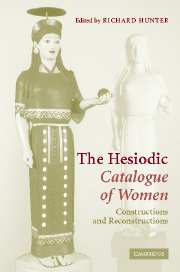Book contents
- Frontmatter
- Contents
- Notes on contributors
- Acknowledgements
- List of abbreviations
- Introduction
- 1 Ordering women in Hesiod's Catalogue
- 2 The beginning and end of the Catalogue of Women and its relation to Hesiod
- 3 Gods among men? The social and political dynamics of the Hesiodic Catalogue of Women
- 4 Heracles in the Hesiodic Catalogue of Women
- 5 Mestra at Athens: Hesiod fr. 43 and the poetics of panhellenism
- 6 A catalogue within a catalogue: Helen's suitors in the Hesiodic Catalogue of Women (frr. 196–204)
- 7 Pulp epic: the Catalogue and the Shield
- 8 The Megalai Ehoiai: a survey of the fragments
- 9 Ordered from the Catalogue: Pindar, Bacchylides, and Hesiodic genealogical poetry
- 10 The Hesiodic Catalogue and Hellenistic poetry
- 11 From genealogy to Catalogue: the Hellenistic adaptation of the Hesiodic catalogue form
- 12 The Hesiodic Catalogue of Women and Latin poetry
- 13 Or such as Ovid's Metamorphoses …
- Bibliography
- Index of passages discussed
- General index
13 - Or such as Ovid's Metamorphoses …
Published online by Cambridge University Press: 22 September 2009
- Frontmatter
- Contents
- Notes on contributors
- Acknowledgements
- List of abbreviations
- Introduction
- 1 Ordering women in Hesiod's Catalogue
- 2 The beginning and end of the Catalogue of Women and its relation to Hesiod
- 3 Gods among men? The social and political dynamics of the Hesiodic Catalogue of Women
- 4 Heracles in the Hesiodic Catalogue of Women
- 5 Mestra at Athens: Hesiod fr. 43 and the poetics of panhellenism
- 6 A catalogue within a catalogue: Helen's suitors in the Hesiodic Catalogue of Women (frr. 196–204)
- 7 Pulp epic: the Catalogue and the Shield
- 8 The Megalai Ehoiai: a survey of the fragments
- 9 Ordered from the Catalogue: Pindar, Bacchylides, and Hesiodic genealogical poetry
- 10 The Hesiodic Catalogue and Hellenistic poetry
- 11 From genealogy to Catalogue: the Hellenistic adaptation of the Hesiodic catalogue form
- 12 The Hesiodic Catalogue of Women and Latin poetry
- 13 Or such as Ovid's Metamorphoses …
- Bibliography
- Index of passages discussed
- General index
Summary
‘In other words, mythography is the history of the invagination of mythological premise and image – of text as image, of text as margin.’
EXEMPLARY MYTHOGRAPHY
‘In 1956 it happened again that a papyrus discovery, ostensibly helpful, started certain scholars off on a false trail. This was the unexpectedly ample proem of the Catalogue (F I), in which the initial appeal “Tell of the women who surrendered themselves to gods” is taken up in lines 15ff. by “– all those that Zeus lay with … and those that Poseidon … and Ares … Hermes …”. This was interpreted by some as an indication that the poem was at least to some extent arranged by gods: first Zeus’ amours, then Poseidon's and so on. But in 1962 the publication of volume xxviii of The Oxyrhynchus Papyri, edited by Edgar Lobel, put our knowledge on a wholly new footing. The available material was nearly doubled at a stroke. As I pointed out at the time, the new papyri established beyond reasonable doubt the correctness of the traditional view that the Catalogue was laid out on the same general principle as Apollodorus' book, with systematic exposition of the great genealogies.'
West here replays a major scene in the dramatic development of the text of the Hesiodic Catalogue of Women. This retrospective offers a series of warnings for any attempt to read an intertextual relationship between the Catalogue and Latin poetry in general and Ovid's Metamorphoses in particular.
- Type
- Chapter
- Information
- The Hesiodic Catalogue of WomenConstructions and Reconstructions, pp. 299 - 319Publisher: Cambridge University PressPrint publication year: 2005



